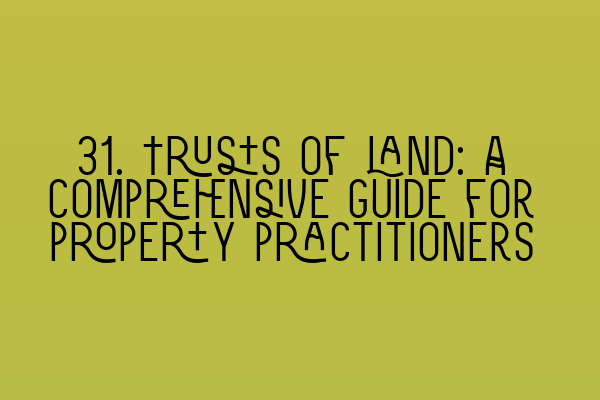Welcome to the Comprehensive Guide on Trusts of Land
As property practitioners, it is imperative to have a comprehensive understanding of trusts of land. Trusts of land play a vital role in property law, enabling individuals to hold and manage property for the benefit of others. In this comprehensive guide, we will delve into the intricacies of trusts of land, exploring their definition, characteristics, creation, and key considerations for property practitioners.
What is a Trust of Land?
A trust of land refers to a legal arrangement where land or any interest in land is held by one person (known as the trustee) for the benefit of another person or persons (known as the beneficiaries).
The trust creates a relationship where the legal ownership of the land rests with the trustee, while the equitable or beneficial interest belongs to the beneficiaries. This division of ownership allows for the trustee to hold and manage the land on behalf of the beneficiaries.
Characteristics of Trusts of Land
Understanding the characteristics of trusts of land is essential for property practitioners. Here are some key attributes:
- Trustee’s Duties: The trustee has a fiduciary duty to manage the land in the best interest of the beneficiaries, exercising reasonable care and skill.
- Beneficiaries’ Rights: The beneficiaries have the right to the use and enjoyment of the land, as well as a right to income generated from the land.
- Equitable Interests: The beneficiaries’ interests in the land are considered equitable rather than legal, meaning their rights are enforceable in equity.
- Sale and Disposition: In certain circumstances, the beneficiaries have the power to compel the trustee to sell or otherwise dispose of the land.
Creation of Trusts of Land
Trusts of land can be created in various ways. Some common methods include:
- Express Trusts: These trusts are intentionally created through a written document, such as a trust deed or will.
- Implied Trusts: Implied trusts arise when the circumstances indicate an intention to create a trust, even if no formal document exists.
- Resulting Trusts: Resulting trusts occur when the legal owner of the land holds it on trust for the benefit of someone else, typically due to the source of funds used to purchase the land.
- Constructive Trusts: Constructive trusts are imposed by the courts to prevent unjust enrichment or correct a wrongdoing.
Key Considerations for Property Practitioners
As property practitioners, it is crucial to consider the following aspects when dealing with trusts of land:
- Legal Requirements: Ensure that any trust of land complies with the legal requirements, such as being in writing for express trusts.
- Trustee’s Powers: Understand the powers and limitations of the trustee, as they are responsible for the management and administration of the land.
- Beneficiaries’ Interests: Assess the beneficiaries’ interests and their rights to ensure they are protected and properly considered.
- Dispute Resolution: Be prepared to handle potential disputes arising from trusts of land, including actions for breach of trust or applications for directions from the court.
Conclusion
Trusts of land are a fundamental aspect of property law, enabling individuals to hold and manage land on behalf of others. As property practitioners, a comprehensive understanding of trusts of land is essential to effectively advise clients and ensure the proper administration of such trusts. Hopefully, this comprehensive guide has provided you with valuable insights into trusts of land and their key considerations.
If you’re preparing for your SQE exams, we also recommend exploring these related articles:
